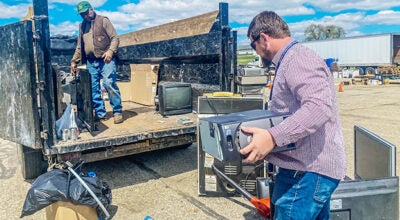Michigan voters legalize recreational marijuana
Published 9:34 am Thursday, November 8, 2018
MICHIGAN — Tuesday, Michiganders voted to make Michigan the 10th state in the country to legalize recreational marijuana.
In Tuesday’s midterm elections, Proposal 1, which allows for the legalization of recreational marijuana, was passed by Michigan voters with a 56- to 44-percent margin.
In Cass County, the proposal passed by a vote of 10,425 to 9,033, while in Berrien County, it passed by a vote of 33,193 to 28,856, according to unofficial election results.
Proposal 1 is a proposed initiated law to authorize and legalize possession, use and cultivation of marijuana products by individuals who are at least 21 years of age and older, and commercial sales of marijuana through state-licensed retailers, according to the official ballot language.
The proposal:
• Allows individuals 21 and older to purchase, possess and use marijuana and marijuana-infused edibles, and grow up to 12 marijuana plants for personal consumption.
• Imposes a 10-ounce limit for marijuana kept at residences and requires amounts over 2.5 ounces be secured in locked containers.
• Creates a state licensing system for marijuana businesses and allows municipalities to ban or restrict them.
• Permits retail sales of marijuana and edibles subject to a 10-percent tax, dedicated to implementation costs, clinical trials, schools, roads, and municipalities where marijuana businesses are located.
• Changes several current violations from crimes to civil infractions.
Recreational marijuana will be taxed at 10 percent, plus a 6 percent sales tax. Revenues will be split three ways, with 35 percent going to education, 35 percent going to roads and 30 percent to cities and counties with marijuana businesses.
The proposal’s victory on Tuesday has left advocacy groups celebrating.
Josh Hovey, a representative with the Coalition to Regulate Marijuana Like Alcohol, said he was happy with the election results. His group advocates that marijuana should be regulated and taxed in many of the same ways that alcohol is.
“Obviously, we are thrilled with the result,” he said. “We have been working hard to educate voters about Proposal 1 and why we believe the prohibition of marijuana has been a waste of law enforcement resources and that we believe regulation and taxation is a far better solution for dealing with marijuana in this state. We are very pleased that voters agreed with us, and that we will be able to begin generating millions in tax dollars for roads, schools and local governments.”
However, not everyone is pleased with Tuesday’s results. Cass County Prosecutor Victor Fitz, who has been a vocal opponent to recreational marijuana, said he believed Tuesday’s vote was a mistake that would harm Michigan.
“I have to say there is real disappointment in the results,” he said. “The concerns of law enforcement, 15,000 medical professionals and the business community is still here and it is still valid, but the community has indicated what they want. We will do our best to protect the community under these new and considerably more challenging circumstances, but the decision has been made.”
Fitz said he believes, based on data from Colorado, that legalization will cause a spike in crime and will lead to increased usage among underage individuals. Now that legalization has passed, he said he believes it would be wise for local municipalities to opt-out of allowing recreational marijuana businesses within their borders.
“Protect your kids,” Fitz said as his piece of advice for voters in the aftermath of the vote. “The wolf used to be outside the door, but now you’ve let him into the living room.”
Despite concerns from opponents of legalization, Hovey said he believes that legalization is good for Michigan.
“All of the worst fears people have had, the data shows [they are] not coming fruition,” he said.
Hovey did warn Michigan residents to be aware that even with the vote, marijuana will not be officially legalized for several weeks and that even when it is legalized that adults using marijuana need to be responsible with their usage.
“It doesn’t mean you can go you smoking in the streets or go to work under the influence. It’s important that people continue to act responsibly,” he said. “The goal of this proposal has been to end low level possession arrests and unnecessary use of law enforcement resources for marijuana, so we need to have people continue to act responsibly so that we can achieve that goal.”






